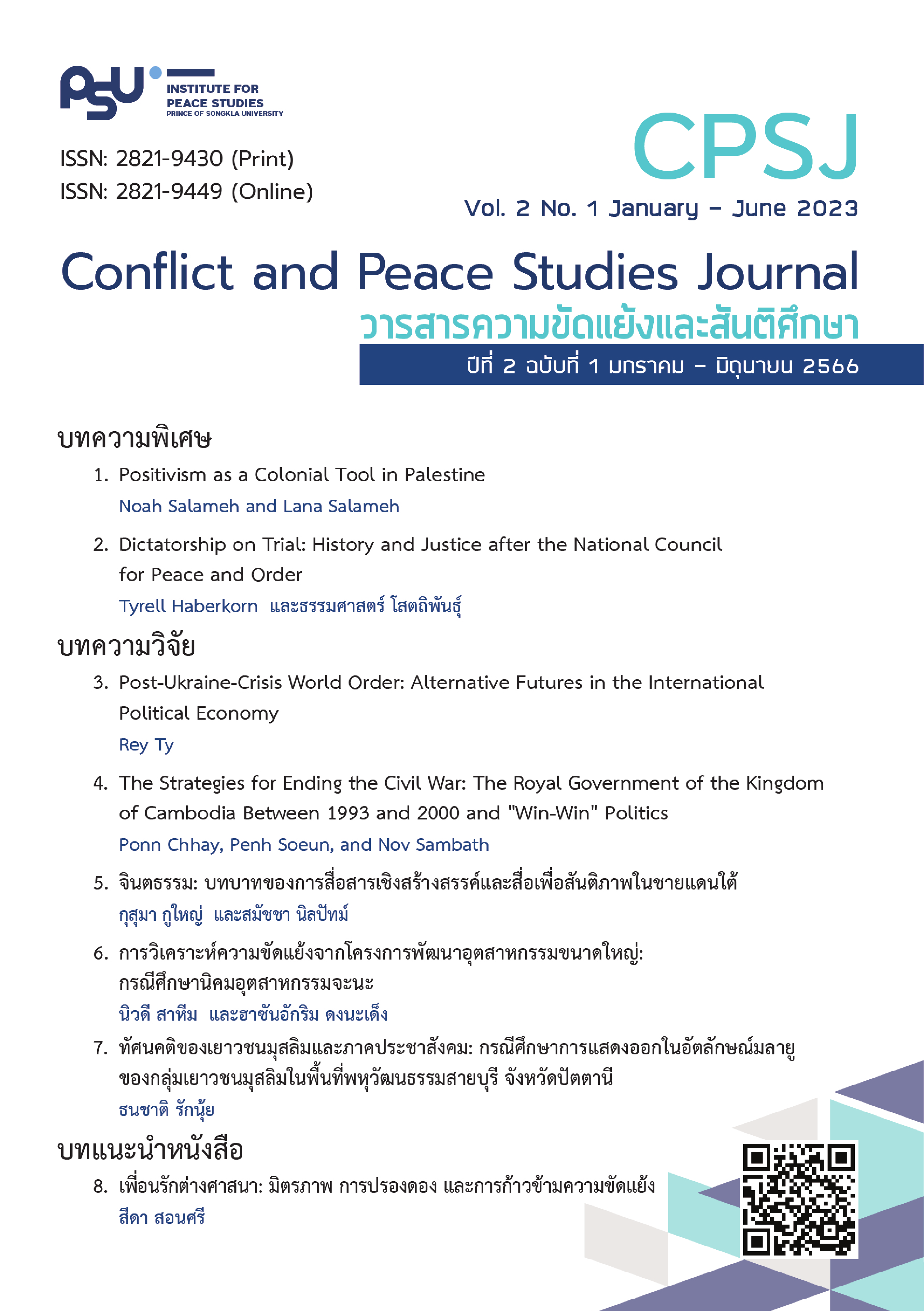Attitudes of Muslim Youth and Civil Society Organizations: A Case Study of an Expression of Malayu Identity in the Multicultural Area of Saiburi, Pattani Province
Main Article Content
Abstract
The objectives of this study are 1) to study the attitudes in expressing Malayu identity among Muslim youth in Pattani Province; expression of Malayu identity of Muslim youth in a multicultural area at Saiburi, Pattani; 2) to study the attitudes of civil society toward the expression of identity of Malayu youth; and 3) to identify the expression of Muslim youth's Malayu identity to various sectors to create understanding and promote coexistence in a multicultural society. The study applied a qualitative research method using semi-structured interviews with selected criteria for interviewees based on youth and civil society participation in the event. Twelve key informants selected. They included nine event participants and event leaders and three representatives from civil society organizations. Research related to the area of investigation was synthesized and analyzed. The research findings and recommendations were presented.
This study revealed that some participants in the activities received news by word of mouth from their seniors, friends, electronic media, and social media platforms. As for coordination with local people, the study found that most of the participants thought the event was a Hari Raya celebration that gathers village people and district people to travel to an event’s venue. The organizer's purpose was to promote the understanding of Malayu identity to both younger participants and the government. The event was held at Wasukri Beach, Sai Buri District, Pattani Province because obtaining permission to facilitate an event there was safe and convenient. The identities that were expressed included authentic Malayu dress, Panchak Silat performance, and the oath of allegiance. Those activities aimed to value the Malayu culture and cherish the motherland among the younger generation born into Malayu and who believe that youth is the hope of peace. Therefore, it is considered a peaceful way to explain the identity of Thai’s Malayu. This study provided a policy proposal to help establish laws and regulations that the governor must be willing to support their lifestyle and Muslim identity, including being truthful, continuing to resolve the problem or issues that occur, non-enforcement with regard to mono-culturalism, the leader resolving problems regularly, and supporting activities for children and youth in the area.
Article Details
References
Chan-aim. (1986). Adolescent Psychology. Bangkok: Praewittaya.
Chotchuang (2011). A study of identity development and school identity Under the Phitsanulok Primary Educational Service Area Office Area 1. Self-study M.Ed. in Educational Administration Naresuan University.
Eawsriwong, N. (2007). Malayu Studies on Fundamental Knowledge of Malay Muslim People in Southern Thailand. 1st Edition. Bangkok: Amarin Publishing.
Fuangfusakul, A. (2003). Identity : Review of theory and conceptual framework = Identity. Bangkok: Committee of the National Research Council of Thailand sociology, NationalResearch Council of Thailand.
Kaeothep, K. (2001). Science of Media and Cultural Studies. Bangkok:Edison Press Products Co Ltd. Kriengsak Chareonwongsak. “Social Skills” Basic of happily living together.December, 3, 2022, Retrieved from http://www.kriengsak.com/node/1288
Kaewkangwan. (1996). Personality Psychology Theory (know me, know him) village doctor. 4th edition. Bangkok.
Karaket, S. (2022). Conflict management from the implementation of government development projects: a case study of Embankment Sea Wall construction project,Muang Ngam Subdistrict, Singhanaki District, Songkhla Province (Research report).Graduate School : Prince of Songkla University.
Leepreecha, P. (2004). Creation and inheritance of the identity of the Hmong ethnic group. In identity discourse. Bangkok: O.S. Printing House. Secretariat of the House of Representatives (2013). The basis of citizenship in a democratic system. Bangkok: the secretariat of the house of representatives.
Madhare, A. M. (2013). Caring for young people according to the Islamic way of Muslim leaders in three southern border provinces (Master's Thesis). Graduate School: Prince of Songkla University.
Paenae, B. (2013). Being Malayu Muslim: Ethnic and Religious Identity in Betong District, Yala Province (Research Report). Graduate school, Thammasat University.
Patyangsi, P. (2013). People's Participation in Local Development: A Case Study of Tambon Tha Luang, Makham District, Chanthaburi Province (Research Report). Graduate School: Rajabhat Rambhai Barni University.
Prasannam. (2007). Gender, Ethnicity and Atalaksh Problems in Touch of Pink. Retrieved November 27, 2022, http://www.midnightuniv.org/midnight2545/document95248.html
Phothisita, C. (2006). The science and art of qualitative research. 2nd edition.
Pongsapich, A. (1999). Culture, Religion and Ethnicity : An Anthropological Analysis of Thai Society. Bangkok, Chulalongkorn University Printing House.
Ramitanon, C. (2004). “Identity, culture and change” Retrieved November 27, 2022, from https://www.soc.cmu.ac.th/
Sengpracha, N. (1989). Forndations of Thai culture. Bangkok : Sirindhorn Anthropology Center.
Supap, S. (1999). Socialization in current Thai families (Master's thesis). Mahidol University Faculty of Social Sciences.
Towtayong, S. (2018). Identity and Identity Maintenance of Melayu Muslim Thai Who Migrated to Bangkok: A Case Study on Muslim Community at Serithai Soi 4 (Thesis Master's Degree). Graduate School : The National Institute of Development Administration.
Tuanbula, K. (2016). Performance of officers at Southern Border Provinces Administrative Centre and right and freedom to Participate in Religious Activities (Research Report). King Prajadhipok's Institute.
Tuansiri, E. (2010). Politics of identity: Diversity and dynamics. “Malayu Muslim Pattani” in the southern border provinces (Master's thesis). Graduate School: Chulalongkorn University.
Wanlem, D. (2009). The development of the concept of harmonious culture of a multicultural society according to the perspective of Border Patrol Police with experience working in the three southern border provinces. Songkhla: Thaksin University.
Weerasai, B. (1974). Social Anthropology (2nd edition). Bangkok: Xpernet.
Weerawitthayanukul, N. (2001). Women's Studies 2. Bangkok: Office of the Promotion and National Women's Coordinator. Office of The Permanent Secretary; Prime Minister Office.
Wongtanee, C. (2012). Diversity, non Diversity: Ethnic Coexistence Management. Bangkok. Amarin Printing. In the area of the southern border provinces, Khemchat Thepthai (editor) Dimensions of culture, history and future image Returning peace to the southern border provinces. Bangkok: Ministry of culture.

